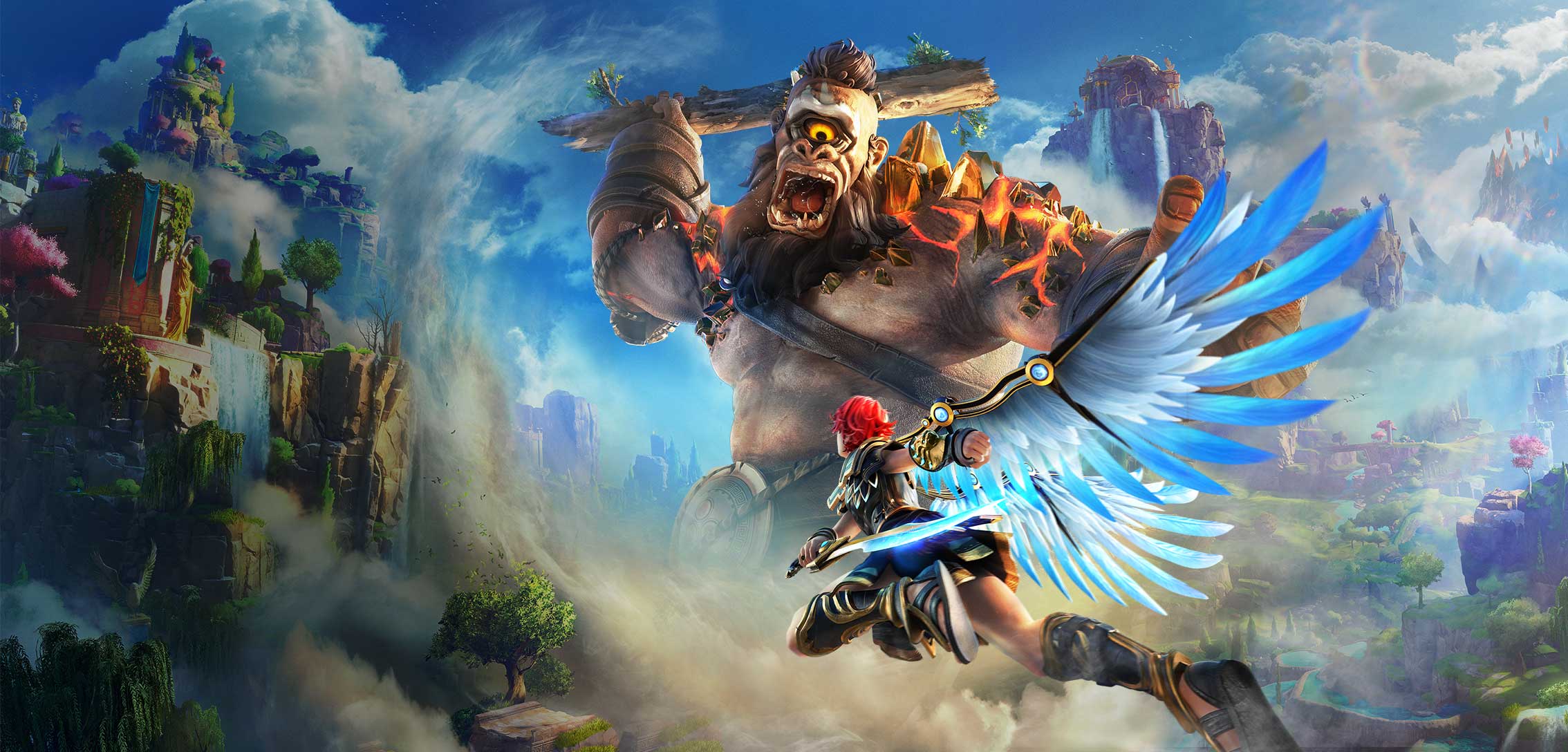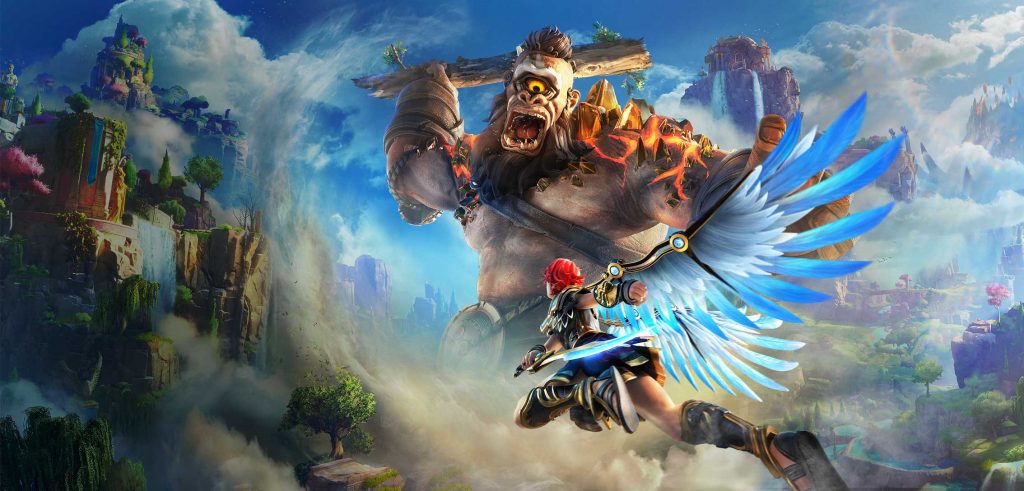

The last time SPIN interviewed Gareth Coker, he was promoting Ori and the Will of the Wisps’ release on the Nintendo Switch.
A mere 9 months later, he’s won the SXSW Gaming Award for Excellence in Score for his work (adding to the three awards he picked up from the first Ori game), been nominated for two others, and watched as the title itself earned some of the highest awards and nominations in the industry.
Oh, and then he also made his premiere on the latest generation of consoles with Ubisoft’s Immortals Fenyx Rising, a hefty RPG with a unique art style, personality, and setting based in ancient mythology.
With Immortals’ three DLCs now released and the game considered a success on virtually every front, we sat down with Coker via Zoom again to discuss the title.
SPIN: With Ori and the Will of the Wisps nominated for Game of the Year last year and on pretty much everyone’s Best of 2020 list, what was it like to see the project so critically acclaimed and beloved by fans?
Gareth Coker: It was an honor just to be nominated in such a great year for video games. There was The Last of Us Part II, Ghost of Tsushima, Spider-Man, Cyberpunk was supposed to be a big release, and that’s just the AAA releases. There were just so many massive games last year — and then there were so many other great games as well. So just to be recognized on that same level as a game that has probably 1/20th of the budget of some of these titles is pretty cool. The wins are great, but the really cool thing is to get nominated, because then you’ve made someone shortlist basically. With winning, so much of it is personal taste, because there might be someone who just doesn’t like orchestral music or something.
Changing to the topic of the day, Immortals Fenyx Rising, what were your initial thoughts on creating a score for such a big project that was also a totally new IP?
Well, I’ve been working now in games for about a decade, and I like to say that I’ve been doing it well for like half of a decade, because now I know what I’m doing. I’ve come to realize that I’m probably at my best when I’m given the freedom to create an IP’s sound from scratch. I did that with Ori, I did it with Ark, and I think I did it with Immortals — and now I’m working on doing it for another thing which won’t be announced for like five years. I think that’s where I can offer the most value. When I was approached by Ubisoft to do this, I’d never really done a big 3D sprawling open-world game before — or at least not a giant, over-the-top, 50-hour epic like Immortals. My first thought was “OK, that means I’m going to have a big canvas and a chance to write a lot of music, which means room to experiment a lot with various ideas and develop them in different ways.” Having that bigger playground and exploring more was obviously very attractive.
And obviously the world of Immortals is based in mythology, but it’s also a very unique setting from a visual perspective. How did that setting affect what you wrote for it?
The first thing that struck me when I saw Immortals was just how it looks. The colors pop. The animations are stretchy. The voice acting is exaggerated. Everything’s kind of over the top. I like to describe it to people as kind of like playing a DreamWorks movie. Compared to Pixar movies, I think the DreamWorks ones take themselves slightly less seriously, and they’re more generally geared towards kids whereas Pixar is working hard to deliver something for kids and adults alike. Both have their merits for sure, but this to me felt like we’re making a Greek mythology DreamWorks game — and I think they executed it perfectly. So if I did a serious Greek mythology soundtrack where it’s entirely authentic and only using instruments from that time period, it wasn’t going to fit. The music would totally not match what was happening on the screen. So I had to basically look at what would bring things to life in an epic and over-the-top way — like the game does — but also keep it grounded in Greek mythology. It’s kind of like a cross between Disney’s Fantasia and traditional Greek music, with a little bit of my “signature” aesthetic that runs through all of my different works. I think it’s fair to say you can hear a bit of Ori in Immortals, but I wouldn’t say Immortals is an Ori-like soundtrack.
Knowing that you were going to need to create significantly more music for Immortals than you ever had before, what was your creative process like?
The first piece I wrote for Immortals was actually the main theme, and that’s not very common. It just happened to work out that way this time. I wrote the trailer first, and then the main theme was born out of the trailer. The thinking behind the main theme was to make sure that it reflected Fenyx’s journey throughout the game. She doesn’t realize who she is or what she’s meant to be when you start the game, and then it reveals that she can develop these godlike abilities throughout the game. I wanted to reflect that journey in the music, so it’s got an intimate quality to it at the beginning, but it also has all of the power and majesty that one would associate with music of the gods.
It seems like the soundtrack itself is pretty varied as far as tone and instrumentation goes. What went into creating that blend of sounds?
In the soundtrack as a whole, we’ve got the orchestral element — which I think is kind of essential for dealing with larger-than-life topics and settings — and we’ve got all the esoteric, non-orchestral stuff for the magical settings like the visits to the underworld and all of the ethereal mythological stuff as well. Then we’ve got the ancient Greek instruments, which aren’t prominently featured all of the time, but a couple of instruments are highlighted. I had a couple of Greek instruments commissioned just for this game that were literally built by hand in Greece with the same materials that they used a couple thousand years ago — so I was a nervous wreck while they shipped across the Atlantic. They’re not always featured prominently, but they’re so unique that I think they’re really cool sounding.
Since the Myths of the Eastern Realm DLC also let you add in some Chinese instruments to the soundtrack too, what was the balance like to expand to a new continent and era of history while still keeping it within the same world?
It’s funny, because it has no relation to the story of the original game, so I think Ubisoft just wanted to explore the same game concept in a different part of the world to see where they could take it. But yeah, the philosophy was similar with deciding which ancient Chinese instruments we could take and apply in a modern setting. But the key was that China has a number of different areas with different dynasties, and some of the instruments in certain dynasties didn’t even exist in others. One of the instruments that any Hollywood movie set anywhere close to China uses is the erhu, which is the Chinese violin. It’s so recognizable, and it just has a certain sound that Hollywood associates with China — which is fine if it’s set in that time period. I worked with Ubisoft Chengdu to make the Chinese expansion, and they prepared all of these documents for me that were so unbelievably helpful. I got a history lesson from them about Chinese instruments and Chinese music in general, just so I could stay on track. They listed a bunch of ancient Chinese instruments, whether they match the era of the expansion, how popular they were, and whether or not they’re overused in modern media. So I looked at that list and said “Well, let’s try to use some of the less popular instruments as well as some of the popular ones, while excluding instruments that wouldn’t be era appropriate.”
I didn’t go all out on the authenticity of it, but I did at least pay attention to it when writing. I think purists would probably listen to the Immortals soundtrack and be like “What the hell is Gareth doing? This is not an authentic soundtrack.” But that’s kind of the point, it’s not supposed to be an authentic soundtrack. It’s just supposed to be an experience that takes you to the time and place of this game. It shouldn’t feel like you could take the music from any random Chinese project and put it into the Chinese DLC. There’ve been a lot of Greek-themed games in recent years, and one thing I’ve really liked about them is that they’ve all had unique sounds. God of War has its own sound, Hades definitely has its own sound, and Immortals definitely has its own sound. I think that’s a testament to the other two composers who worked on those games as well.


Leave a comment